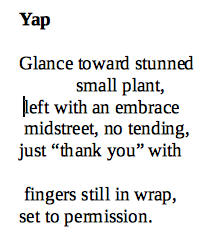Nice book so far. If he’s confessing to never being in love, then he should bloody well hurry up. Heavy on the S&M references, I have no complaints. Had originally thought the hoot went on too long without being funny, but I think that lacks subtlety. If I pay attention, Sheppard keeps reappearing, slightly altered and with no less aplomb. There are few lines that you can take seriously, not without being turned off sex from here on in. “Now / then: hate is when you’re feeling top of the pops”. Thatcher is all.
The next section is titled ‘overdubs’, and I liked the engagement with sonnet xxi of Milton’s (he sharpens it nicely), but feel let down by most of it. The last poem in this section, dedicated to “Lee” (could be Lee Harwood), ends “… Cast light
on this dimness of knowing, straining across
the expanse to take in tree or meadow or cottage.
This is a haunt of the living. Let it go.”
There are allusions / references which work in an unusual – i.e. satisfying – way; it reads somewhat like a medley of different, I suppose you could say, “songs” (at fist I balked at ‘Song Net’, just before this poem, felt let down again, but it’s funny). Incidentally “a haunt of the living” has just four google hits, topped by the Pakistan Animal Welfare Society. And I’m guessing he’s addressing himself in the last sentence, but I am lost as to what he’s so angry about, if he feels e.g. cheapened by still being alive. So anyway, the problem I have with all this is his personality is a pain in the neck, and stamped heavily on all of these poems. Maybe Harwood liked his personality; your guess is as good as mine. Did you hear the one about Thatcher on a Brighton postcard?
These are fun sonnets that invariably close strongly, but I really want to engage with the “writing” more than ‘Sheppard’, which I cannot do, if only because of my unfamiliarity with the tradition. I am not being hyper-critical, Sheppard is meant to be one of the most important modernists still writing. Maybe you need some “trickster” theory…
The third section ‘It’s nothing’ is genuinely impressive. Sheppard’s humour is not entirely absent, but there is elegance to his references to e.g. “Lee”, and the poems seriously drag you in via cacophony and respite of its characters.
The book is a success.
